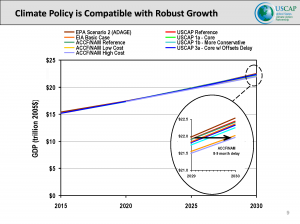December 2009 Vol. 236 No. 12
Web Exclusive
Study Tallies Cost of Climate Legislation

The U.S. Climate Action Partnership (USCAP), an alliance between 26 major corporations and several environmental organizations, has analyzed the economic effect of its recommendations to Congress concerning climate legislation and projected that the U.S. GDP would grow 70 to 71 percent by 2030 under the proposed scenario.
Simulating the behavior of the economy without any climate legislation, the group determined growth of 71 to 72 percent could be expected.
Results of the study were released Dec. 2. The study was performed using ADAGE and NEMS-USCAP, economic models USCAP says are “similar to” those employed by the EPA and the Energy Information Agency (EIA) in their review of climate legislation. USCAP defines itself as “a group of businesses and leading environmental organizations that have come together to call on the federal government to quickly enact strong national legislation to require significant reductions of
greenhouse gas emissions.” Members include BP America, Shell, ConocoPhillips, Honeywell, GE, Dow and Siemens, as well as environmental activist organizations the Environmental Defense Fund and the Pew Center on Global Climate Change.

The study projected the U.S. GDP would reach $22.3 trillion in 2030, with climate legislation pushing that point back by two to four months depending on the scenario. USCAP notes that its results are comparable to those reported by the EPA and EIA in their examination of the American Clean Energy and Security Act introduced by Reps. Waxman (D-CA) and Markey (D-MA).
The USCAP study found that the use of carbon offsets is an essential ingredient in containing costs. Delays or strict limits on a domestic and international offsets program were deemed likely to increase total costs.
In addition, the study found that complementary policies for energy efficiency, transportation and the accelerated development of carbon capture and sequestration, among others, are especially important to advance technology and lower future energy spending.





Comments